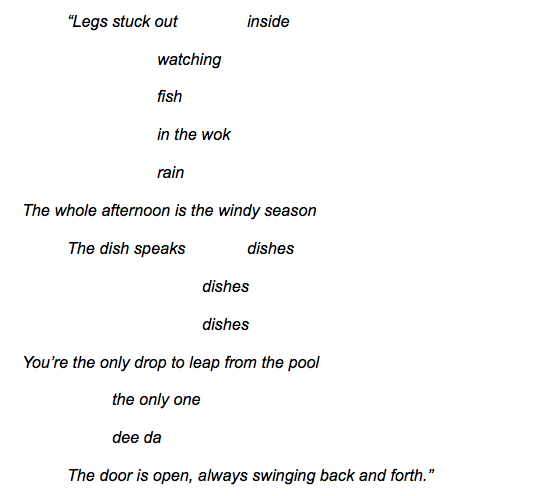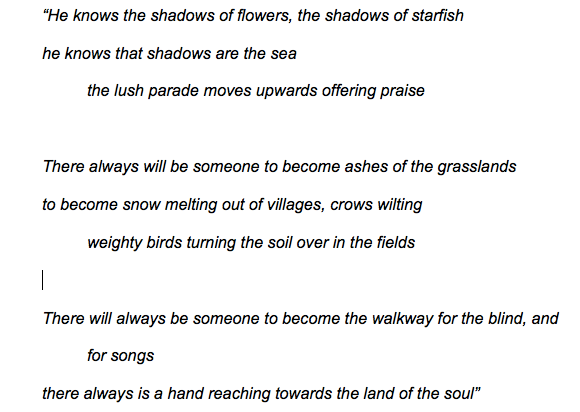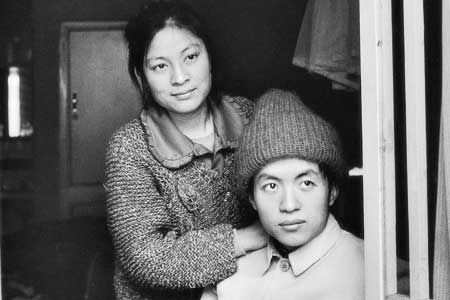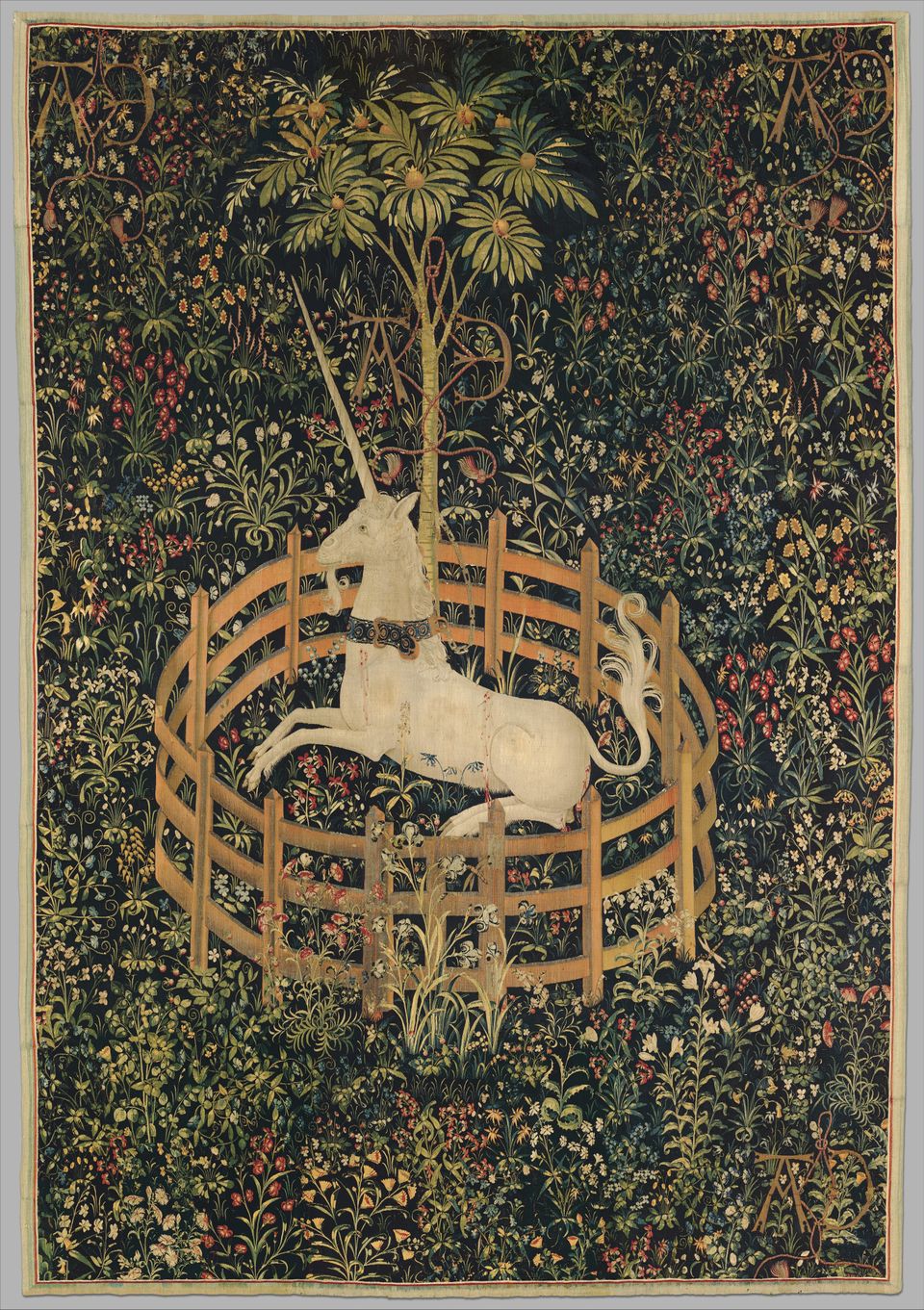“Children trap bees
for their flowers
the world traps people
for itself”
—Gu Cheng, “The Art of Pulling Strings“
Any author with an unusual death will have their life read backwards. Of course, this isn’t just true for authors. Anyone in the public eye who avoids the cancers, heart attacks, and car accidents that kill most of us will have their death overshadow their life. The Chinese modernist poet Gu Cheng, whose violent end is frequently placed at the centre of his work, is a case in point. In 1993, exiled from China and living in the isolated New Zealand community of Waiheke Island, Gu Cheng murdered his wife Xie Ye with an axe. Afterwards, he ran to his sister’s house to tell her what he had done and, in the confusion that followed, Gu Cheng hung himself. He was 37. Xie Ye was 35.
While remaining relatively obscure in the West, Gu Cheng is remembered in China as a prominent member of the so-called Misty Poets. Writing in the aftermath of the Cultural Revolution, the burgeoning poets group attracted an enormous following among the country’s disaffected young. Their name, menglong, meaning hazy or obscure (hence Misty Poets), was intended as a criticism by the authorities. The Misty Poets’ work was an obvious departure from pro-CCP rhetoric of previous decades, and the poets risked their personal safety by publishing. Gu’s most famous poem, “A Generation,” gives some sense of the anger, alienation, and optimism that runs through the movement’s work.
“Even with these dark eyes, a gift of the dark night
I go to seek the shining light.”
Gu would go on to write more surreal modernist verse, dramatically departing from traditional forms of Chinese poetry. Writing for the London Review of Books, Eliot Weinberger notes that, despite Gu’s limited access to Western Modernism, he recreated many of its techniques.

—”Dee dee da dee da” (excerpt)
Eliot argues Gu’s creativity and innovation make it probable he “was the most radical poet in all of China’s 2500 years of written poetry.”
Gu is not the first significant writer to have murdered his spouse. William Burroughs and Louis Althusser both killed their wives, though in circumstances suggesting diminished responsibility. Althusser was mentally ill and Burroughs shot Joan Vollmer only after the unfortunate decision to combine generous amounts of alcohol with a game of William Tell. Whether Gu was also mentally ill is unclear. His eccentricities certainly contributed to the isolation that the couple endured in Waiheke. Gu refused to learn English in case it interfered with his ability to write in Chinese. He also had a tendency to wander around with the snipped-off end of a trouser leg on his head. When asked why, he explained that it helped protect his thoughts.
Debates over the role of an author’s life usually begin when his or her beliefs are in some way problematic. There is Heidegger’s much debated association with Nazism, Lovecraft’s racism, and Charlotte Perkin Gilman’s enthusiasm for eugenics. The question is: How do those beliefs affect the writing? If the writing is good enough it tends to be a reminder that people, and the world around them, are complex. By creating a nexus for critical thought, authors go some way towards undermining their own stereotypes. In contrast, poor writing that is bigoted typically survives as a historical artifact, not as art. Trying to assess the significance of a violent action in relation to art is far more difficult. Vicious or stupid beliefs can be swept away into the broad category of social fault, while cruelty, on its own, is individual.
There is a danger of holding artists up to a different moral standard than everyone else. Most of us are fortunate enough not to have our work evaluated in relation to the worst things we’ve done. This is partly because artistic fame results in the scrutiny of private life. It’s also partly because of the closer-to-the bone relationship we have with art: it is a commodity that affects us more deeply than most others. In other words, very few of us care if the postman is a bastard so long as the mail arrives on time. We simply want the mail. And while art shouldn’t be read as a purity test for the intentions of the artist, it’s disingenuous to pretend that life and work can always be comfortably separated. Texts aren’t impersonal objects, and this is readily apparent in Gu’s own work. His poetry, however surreal, frequently touches on everyday life and his own experiences. There is an abundance of natural and rural imagery, his family having been “sent down” to the countryside during the Cultural Revolution.

“Mouth of the River”, excerpt
The attention Gu and Xie’s deaths attracted in China was bolstered by the recent publication of their book, Ying’er: the Kingdom of Girls. While presented as fiction, Ying’er is a thinly veiled account of Gu’s life on Waiheke. Xie is listed as a co-author, but in reality contributed only a small portion of the text. The theme of Ying’er is Gu’s relationship with Xie Ye and his girlfriend Li Ying, all of whom were living together on the island. Gu and Li had met when she was still a student. They continued to exchange letters after he moved away until, in 1989, Li Ying managed to acquire a New Zealand visa, claiming political asylum after the Tiananmen massacre.
Unsurprisingly, the accounts of how and why Li Ying came to live with the couple are contradictory. Li Ying herself wrote a book called Heartbroken on Waiheke which included her disappointment with their shared primitive house and simple lifestyle. Li also wrote that she had been unaware Gu expected a sexual relationship. This was, according to Gu’s sister, contradicted by Xie. Li, she claimed, had shared Gu’s dream of a “kingdom of girls” from the beginning.
The role that Xie Ye played in Li Ying’s arrival is unclear. Anne-Marie Brady, who befriended Xie and Gu on Waiheke, paints a portrait of surprising intimacy between the two women, punctured by the perhaps inevitable squabbles and moments of jealousy. Some of that jealousy was from Gu himself who was envious of the two women’s relationship. Nevertheless, Li’s presence on the island appears to have been entirely arranged by Gu.
However, Weinberger suggests somewhat darker motives. He encountered the couple when they were living in Berlin on Gu’s DAAD (a German academic exchange service) fellowship, writing:
“Xie Ye gazed at him adoringly the whole time, and both of them radiated an innocent sweetness. I felt I was in the presence of one of those crazy mountain sages of Chinese tradition.
Somewhere in the evening, Gu Cheng left for the bathroom, and as soon as he was out of sight, Xie Ye turned to me smiling and said: ‘I hope he dies.’
Xie Ye, Weinberger writes, said that she had accepted Li Ying in the hope that the young woman would replace her as Gu’s wife. The reasoning was Gu’s jealousy, which extended even to their young son, Sam. Sam had been given into the care of a Maori woman named Poko after Gu confessed to having violent impulses toward his son. Brady also describes Xie’s distress over being separated from Sam. She highlights a passage addressed to him that Xie contributed to Ying’er:
“In the face of such ugliness and suffering, my fragility is no different from yours. How I wish you didn’t know such unbearable sadness in me. You have just turned three and we have nothing but each other.
Though Xie had begun an affair in Berlin and seemed to have been considering leaving Gu, her hope of regaining custody of Sam kept Xie from escaping Waiheke. Despite his own history, Gu Cheng was unable to tolerate Xie’s new partner. By then Li Ying had left Gu for a middle-aged martial arts instructor, and afraid that Xie would leave him as well, Gu’s behaviour became increasingly erratic. By his own admission, he had tried to strangle her while they were in Berlin. After the couple’s return to Waiheke, Gu refused to let Xie go anywhere on her own. Xie attempted to remove Sam from school in order to flee, but was prevented by the principal. Without legal custody of Sam, she chose to remain on the island. Shortly after she risked running away with their son, Gu murdered Xie.
Gu’s history of brutal domestic abuse makes appreciating his poetry uncomfortable. In the absence of biographical details, however, his work is original, eloquent, and provocative. The question is, whether to try and bridge that gap between art and life? Eliot argues that, “When you forget about Gu Cheng, you can begin to read him.” And it is true that poems like the sardonic “A Banner” are best read without considering Gu’s personal history.
“Death is relatively minor procedure
just a small excision of life
it doesn’t even leave a scar
And after the procedure the patient is remarkably calm”
“A Banner” was written over a decade before Gu murdered Xie and it makes little sense to leap backwards through time and interrogate the poem. The injunction to “forget the life”, however, requires something impossible: refusing to acknowledge what we already know.
There is no straightforward response to the problem of biography. Our home, as readers, may be in the ambiguous division between life and art. Gu was a brilliant poet who murdered Xie Ye, two disparate but connected components of the same life. And that tension, for his readers, should be difficult.
SourcesSea of Dreams: The Selected Writings of Gu Cheng. Translated by Joseph R. Allen. New Directions Books, 2005.
Anne-Marie Brady. Dead in Exile: The Life and Death of Gu Cheng and Xie Ye. China Information. Vol XI, No.4 (Spring 1997)
Eliot Weinberger. Next Stop, Forbidden City. London Review of Books. Vol. 27 No.12, 23 June 2005. http://www.lrb.co.uk/v27/n12/eliot-weinberger/next-stop-forbidden-city




